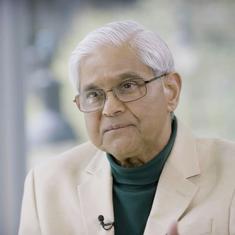Sri Lankan artist, illustrator and writer Sybil Wettasinghe died of complications related to old age in the early hours of July 1. Born near the southern city of Galle in 1927, the children’s book writer was a national icon in Sri Lanka. Her most famous work Kuda Hora (The Umbrella Thief), published in 1956, was translated into nine languages including Norwegian, Chinese, Japanese and Tamil.
Wettasinghe began her career as a journalist and joined the Sinhalese-language Lankadeepa at the age of 17. Her work became famous across the island when she joined Janatha , a part of Sri Lanka’s large media house Lake House Publications.
International acclaim
Kuda Hora was first published in the children’s page of Janatha in 1952. The story became a massive success in Sri Lanka and was translated into English, Korean and other foreign languages. In 1987, the Japanese translation won the Japanese Library Association Award as the most popular children’s book.
A talented illustrator, Wettasinghe would regularly hold exhibitions in Japan, where she continued to receive awards for her books. In 2012, she was awarded the Nikkei Asian Prize for Culture.
Her books were also popular in Scandinavia and were translated into Swedish and Danish.
In Sri Lanka, she was awarded the Vishwa Prasadini Award for Art and Children’s Literature by Prime Minister Sirimao Banadaranaike in 1996. In 2004, she was also awarded the Kala Keerthi, an national honour that is awarded for extraordinary achievements in the fine and performing arts.
Although Wettasinghe primarily focused on children’s literature, she released a collection of short stories for adults in 2012 titled My Giddi Aunty. The stories were written in the 1950s and 60s and lost for a few decades.

The child in her
It was primarily her love for children and the desire to bring out the inner child in herself that was a driving factor for Wettasinghe. Her autobiography, titled Eternally Yours, describes her childhood in rural southern Sri Lanka and her family’s move to Colombo when she was a teenager. She ends it with an illustration and an accompanying message that reads, “Keep a child in your heart for eternal life.”
In long conversations with this writer, she often spoke of how birthday celebrations organised by the government were her sole reminder that she was pushing 90 years, and that she took pride in feeling like a child.
Among her famous children’s stories are “Vesak Lantern”, which won the Isabel Hutton Prize for Asian Women Writers for Children in 1965, “Hoity the Fox”, “Palingu”, “Run Away Beard” and “Kirihamy”. The Child in Me, which was published in 1995, was translated into Tamil, Japanese, Dutch and Sinhalese.

Love for India
Although Wettasinghe’s books and stories never got the kind of attention they deserved in India, the writer had a special love for the country. She regularly recalled her first visit to Calcutta in the 1960s, when she was thrilled to see young women in “flowing saris who looked like flowers on an Indian landscape.”
A follower of the Buddha’s principles, Wettasinghe went on pilgrimages to Sarnath, Bodh Gaya, Lumbini and Kushi Nagar, describing these voyages with a particular degree of joy.
It was her heartfelt desire to complete a new book with illustrations of the life of the Buddha and present it to the Indian Prime Minister when he visited Sri Lanka for Buddha Purnima a few years ago, but it was not to be.
Wettasinghe would listen to Pali chants and Buddhist sermons late into the evenings and wake up early before the first rays of dawn entered her home in the leafy and peaceful town of Nugegoda, which is just outside Colombo city limits. Her husband Don Dharmapala Wettasinghe, whom she married in 1955, was the editor of Chief of Lake House Publications. He died in 1988. Sybil Wettasinghe is survived by her three children and five grandchildren.
Ajay Kamalakaran is a journalist and writer based in Mumbai. His Twitter handle is @ajaykamalakaran.










